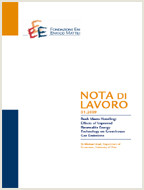Environmental Policy, Education and Growth with Finite Lifetime: the Role of Abatement Technology

09.05.2010
Xavier Pautrel
Q5
Growth, Environment, Overlapping Generations, Human capital, Finite Lifetime, Abatement
Climate Change and Sustainable Development
Carlo Carraro
This note shows that the assumptions about the abatement technology modify the impact of the environmental taxation (both the size and the “direction”) on the long-run growth driven by human capital accumulation à la Lucas (1988), when the source of pollution is private consumption and lifetime is finite. When the human capital’s share in the abatement services production is higher (respectively lower) than in the final output production, a higher environmental tax reduces (resp. increases) the allocation of human capital in production sectors (abatement service and final output) and boostes (resp. decreases) the BGP rate of growth. When abatement services are produced with the final output, the environmental taxation does not influence growth.
